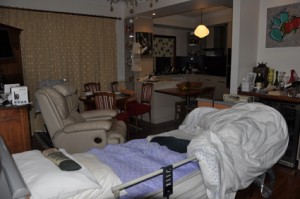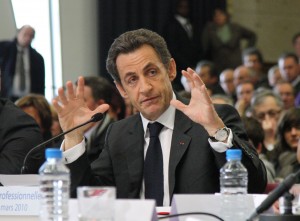Australia’s first professor of palliative
care originally set out in the world to become a medical missionary. But life and
fate had other ideas, as SAMELA HARRIS
reports on the man some people call…
* * *
IT’S as if an aura of serenity surrounds him. When Professor Ian
Maddocks steps into a room, a sense of calm descends.
It’s not just that he relieves suffering. He gives also a gentle
spirituality which has led some, whose lives he has touched, to
describe him as a “living saint”.
Professor Maddocks, the just-retired chief of Daw House Hospice, at
Daw Park, is Australia’s first and pre-eminent professor of palliative
care.
He lives among the dying and the grieving. It is a world which has
chosen him, as much as he has chosen it. Life takes circuitous paths
and Professor Maddocks did not set out to become an urban death
doctor.
He set out to become a Third World Presbyterian medical missionary.
With youthful bravado, he studied medicine and theology
simultaneously, forsaking the intellectual stimuli of the former only
when the time demands of clinical medicine became overwhelming.
Completing medicine, the next crunch came with the revelation that
medical missionary postings were hard to come by. The hospital in
Korea closed after the Korean War and the New Hebrides hospital was
fully staffed.
So Professor Maddocks headed for Papua New Guinea and the medical
school in Port Moresby. Fourteen years later, he left PNG a changed
man.
Working with the local people had not been enough for Maddocks and his
family. They left the Port Moresby expatriate dwellings and moved into
a Papuan village, to live in a house on stilts over the water where
mother, father and three children bunked down in one room, where a
bucket served as a shower and where the toilet flushed into the sea.
Professor Maddocks was delivering sermons as well as teaching and
practising medicine, but his feelings towards the Church and its
concept of doing good were undermined by the influences of the ancient
indigenous beliefs.
He learnt about ancestor spirits, the power of sorcery, using
dreaming, the attribution of mortal blame for sickness and the way in
which the Papuan families worked things through as a group.
These ancient systems were health-promoting and made him “more
accepting of different views of things and less sure of what I was
doing there myself”.
These influences have flowed on through the professor’s life. His is
an approach of gentle tolerance. He makes no judgments on people and
their beliefs. He believes in listening to what other people know.
When PNG was about to become independent, in 1974, the Maddocks family
returned to Australia with a group of fellow expats and, with another
family, set up in North Adelaide as an experimental family commune.
For 31/2 years, the group, with six children between them, thrived,
living, working and endlessly discussing things together. They had no
television and no car. “We’d go out to visit and there would be 12
bicycles heading up Glen Osmond Rd quite a caravanserai,” recalls
Professor Maddocks.
He perceives the experiment as “a useful experience”. “We were
reminded quite often about how much time you have to give to
interaction,” he says. “You can’t be crisp and quick if you are
trying to manage a community of people. There was a lot of talk,
resolutions and different ideas.” He then was working a private
practice with his counsellor wife, Diana, and teaching fifth-year
medicine at Flinders.
Then he read an article in the Guardian Weekly which was to throw new
purpose into his life. It was an account by Victor Salsa of his
daughter’s dying in a hospice near Oxford, in the United Kingdom.
“The thing which compelled me was that the young woman dying of
cancer had been able to look after her parents as they went through
the awful prospect of losing her,” he reflects.
He concluded that it was the good hospice environment, the medical and
emotional support, which had made the difference. He took the idea to
the Flinders Medical Centre’s administration, suggesting that they set
up some sort of a hospice in the grounds.
A committee was formed. The Anti-Cancer Foundation, loss and grief
counsellors, District Nursing and GPs came together and the Southern
Hospice Program emerged. It started slowly assigning cancer-ward
nurses to work on palliative care, and the Health Commission allocated
sessions from an anaesthetist.
“Gradually we got more and more,” says Professor Maddocks. “We did
a study on the gaps in care and from that we wrote a submission for
the establishment of a hospice here. The old TB hospital, Killara, was
contemplating a hospice, too, so we liaised. By the middle of the
1980s, we were a team of about five people. In 1987 came the
opportunity to create a chair in palliative care.
“Half-joking, I said I would not mind the job if it gave me a
secretary. At the time, I was not in a salaried position.
“I was only paid when I was working and I was involved in Physicians
Against Nuclear War, going to conferences and executive meetings and
always without income when I was away. So I applied for the chair.
There was not much competition, none. All I could show was that I was
a fairly wide-ranging physician and I had an interest in this area.”
That was 10 years ago. Daw House, a handsome old building with modern
additions, set in a bird heaven of park-like grounds, now is a
respected institution of compassionate caring, albeit engaged in an
emergency appeal for funding. Fragrant oils subtly scent the air, the
sun streams into a lush little enclosed courtyard affectionately known
as “Hayman Island”.
Kind staff tend to a steady turnover of dying in the 15 beds, while
outreach staff visit patients in their homes, managing their pain and
monitoring their wellbeing. The hospice’s protective wings spread out
over such an expanse of the southern suburbs that Professor Maddocks
hopes that expansion will lead to a unit at Noarlunga Hospital.
Throughout the hospice, which abuts the sprawling Repat Hospital, he
is known simply and in quite quiet reverence as “The Professor”. He
is never far from his people’s needs this tall, gentle, wise man with
his serene touch.
Professor Maddocks was 56 when he was appointed to the chair of
palliative care. He realises that few people have such chances at that
time of life.
He says it has been “fun”, then changes his choice of word to
“joy”.
“It is an area which is really serious and filled with sadness and
loss,” he says. “But the staff make a lot of support.” Special
people are attracted to palliative-care work people who can reach out
into the discomforts of others. “They are a very nice group of people
and they look after each other, too,” he says. “If I am having a
hard time, someone is likely to hug me or ask me if I am okay. People
working in this area feel useful; their attention and intuitions are
able to operate fairly freely.
“They are not trying to apply clever recipes and do clever procedures
that people just have to accept. It is much more interactive. People
therefore respond very warmly; they are grateful for the interest,
skills and attitude staff bring to this kind of work, so they feed
back very nice things to them.”
Professor Maddocks travels widely, sharing learnings on palliative
care, running workshops, lecturing in such places as Korea, Mongolia,
China, Japan, Burma, Malaysia and the Philippines.
He no longer actively practises any form of religion. “Spirituality
is a part of what you do when trying to help people to find meaning in
an experience, a crisis. Sometimes you are not using a spiritual
vocabulary but are touching on things which are very important to
people and ought to be more spiritual,” he says.
Professor Maddocks sees death not with a bright light at the end of a
tunnel but as “a physical and intellectual closure”. But the dead
remain connected to the living in thoughts and genes.
“When patients are dying and their families talk about meeting them
at the other end, I have sympathy for that,” he says. “What is so
absolutely marvellous is that you don’t know. There is an excitement
about it. It preserves a sense of wonder and awe. I am in awe of
death.
“It’s an extraordinary experience to watch someone quietly stop. You
wonder what will be one’s death and hope you do it well and have
courage. I hope I am programmed to accept it.
(Samela’s article has been reproduced courtesy of The Advertiser.)

